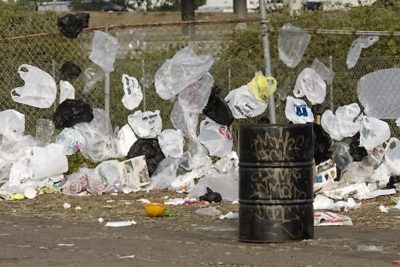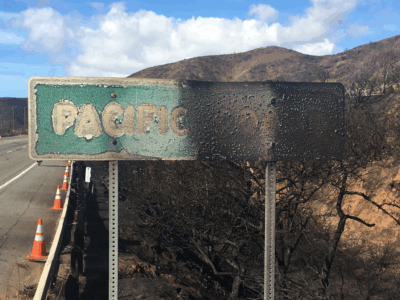Plastics and our Future
How to turn off the plastics spout?
 Kudos to National Geographic for its stunner of an issue on plastics and the environmental harms they cause. As this latest report and many other recent stories make clear, we are drowning in plastics. Bits of plastic have been found in beer, in major brands of bottled water, in 75% of deep sea fish, in the soils of the Swiss mountains, and at the bottom of the deepest ocean trench on Earth. We make ungodly amounts of plastic each year and then toss it, mostly without care, so that it makes its way to our rivers and oceans. Even when we try to dispose of it responsibly or biodegrade it, we largely fail. For the most part, we are stuck with the plastic we make for a very, very long time.
Kudos to National Geographic for its stunner of an issue on plastics and the environmental harms they cause. As this latest report and many other recent stories make clear, we are drowning in plastics. Bits of plastic have been found in beer, in major brands of bottled water, in 75% of deep sea fish, in the soils of the Swiss mountains, and at the bottom of the deepest ocean trench on Earth. We make ungodly amounts of plastic each year and then toss it, mostly without care, so that it makes its way to our rivers and oceans. Even when we try to dispose of it responsibly or biodegrade it, we largely fail. For the most part, we are stuck with the plastic we make for a very, very long time.
The problem is accelerating. As the NatGeo story highlights, “[p]roduction has grown at such a breakneck pace that virtually half the plastic ever manufactured has been made in the past 15 years.” Most of that production creates single-use plastic, the detritus of food wrapping and Amazon packaging and plastic goody bags containing endless kids’ party favors, most of which (I can report from kidland) are also made from throwaway plastic. “Roughly 40 percent of the now more than 448 million tons of plastic produced every year is disposable, much of it used as packaging intended to be discarded within minutes after purchase,” NatGeo notes. Polluting so much of the earth over geological timescales for such fleeting conveniences seems the definition of short-sighted.
So what should we do? A lot can be accomplished by challenging our throwaway-plastic culture, both through education and through regulation. We need to reframe how we think about plastic, to consider it an incredibly useful commodity that should be much more rarely and carefully deployed. Any American who has shopped at a western European grocery store and stood waiting, futilely, for free plastic grocery bags at the end of the checkout line knows that cultural norms are powerful (and knows to bring a bag next time). Some cities and counties in the U.S. are making that transformation too, including L.A., which banned free plastic grocery bags a while back to pretty good effect. San Francisco and other jurisdictions are also considering banning throwaway plastic straws, or making them unlawful to hand out except at a customer’s specific request. These are small steps but important ones, useful both for waste reduction and education. We talked about initiatives like these, and other useful ideas a bit grander in scale, in a a UCLA Emmett analysis a few years back on plastics in the oceans. Unfortunately it remains relevant reading. I’m looking forward to seeing more good ideas put into practice as stories like NatGeo’s get more attention.
p.s. obligatory reference to The Graduate here. Plastics are our (regulatory) future!
Reader Comments
7 Replies to “Plastics and our Future”
Comments are closed.







Whatever happened to paper straws?
They sucked. and who need straws to drink, unless you are in a hospital bed, using straws are just adding to waste.
Thank you for printing this! For the past several months, I have been working to reduce the use of plastics for myself and the family, including choosing when possible to buy items without plastic packaging. it is very difficult. Though thankfully not as harmful as manufactured radioactive materials, plastics may be as long lasting as the most long lived radioactive waste. Any legislation or other legal means of reducing plastics is a good use of our legal and regulatory systems! Please continue to write on this vital topic.
Great post, Cara! Regarding plastic grocery bags, all of California banned free bags like the ones in the photo and voters upheld the ban by passing Prop 67 in 2016.
Where have you gone, Joe DiMaggio?
Thanks for the post. In a family discussion yesterday, the volume of waste from plastics was discussed. Petroleum was mentioned, as the source of plastics. Coke shipments to Far East electrical generating plants was also mentioned, as an example of innovative use of byproducts from refining. Then, the talk turned to the Chicago packinghouse industry’s history. Swift’s “Use everything but the squeal” led to this: https://en.wikipedia.org/wiki/Gustavus_Franklin_Swift, with this passage.
“In response to public outcries to reduce the amount of pollutants generated by his packing plants, Swift sought innovative ways to use previously discarded portions of the animals his company butchered. This practice led to the wide scale commercial production of such diverse products as oleomargarine, soap, glue, fertilizer, hairbrushes, buttons, knife handles, and pharmaceutical preparations such as pepsin and insulin. Low-grade meats were canned in products like pork and beans.”
Are there some ideas from the “packinghouse history/use everything but the squeal/reduce pollution” that could be applied to the plastic waste problem?
What about sea salt? https://www.nature.com/articles/srep46173 And, what about coke?
Again, thanks for the blog.
Jim Arnold
A bit of a paradox is that plastics based on biological feedstock (usually ethylene derived in turn from biological methane) could be a carbon sequestration mechanism if they did not biodegrade.
This is essentially a lesson from coal, which sequestered carbon during the Carboniferous Era because bacteria couldn’t break down lignin, one trees evolved to make wood.
Of course it would be best if the plastic ended up in long term storage such as a substitute for asphalt in roads or something similar rather than floating around in the ocean.
One idea; converting plastic waste to fuel is good in terms of reducing pollution, but it releases the carbon in the plastic into the atmosphere.